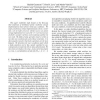Free Online Productivity Tools
i2Speak
i2Symbol
i2OCR
iTex2Img
iWeb2Print
iWeb2Shot
i2Type
iPdf2Split
iPdf2Merge
i2Bopomofo
i2Arabic
i2Style
i2Image
i2PDF
iLatex2Rtf
Sci2ools
114
click to vote
DSN
2006
IEEE
2006
IEEE
Lucky Read/Write Access to Robust Atomic Storage
This paper establishes tight bounds on the best-case time-complexity of distributed atomic read/write storage implementations that tolerate worst-case conditions. We study asynchronous robust implementations where a writer and a set of reader processes (clients) access an atomic storage implemented over a set of 2t+b+1 server processes of which t can fail: b of these can be malicious and the rest can crash. We define a lucky operation (read or write) as one that runs synchronously and without contention. It is often argued in practice that lucky operations are the most frequent. We determine the exact conditions under which a lucky operation can be fast, namely expedited in onecommunication round-trip with no data authentication. We show that every lucky write (resp., read) can be fast despite fw (resp., fr) actual failures, if and only if fw + fr t - b.
Asynchronous Robust Implementations | Atomic Read/write Storage | Computer Networks | DSN 2006 | Lucky Operation |
| Added | 22 Aug 2010 |
| Updated | 22 Aug 2010 |
| Type | Conference |
| Year | 2006 |
| Where | DSN |
| Authors | Rachid Guerraoui, Ron R. Levy, Marko Vukolic |
Comments (0)

